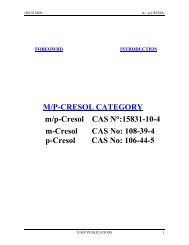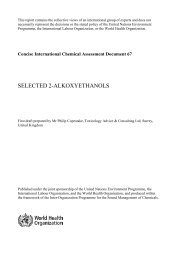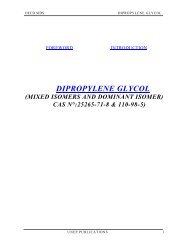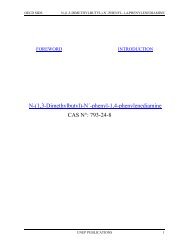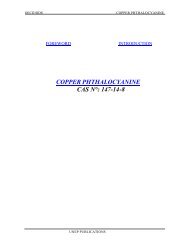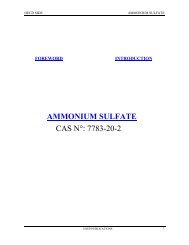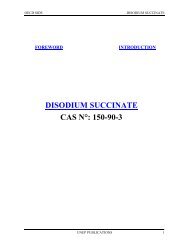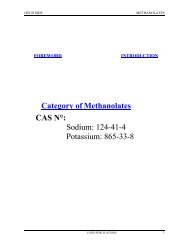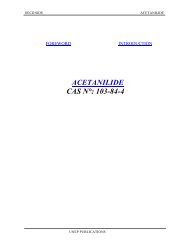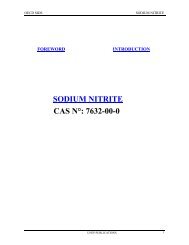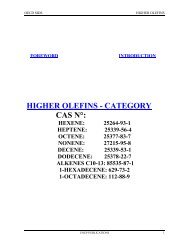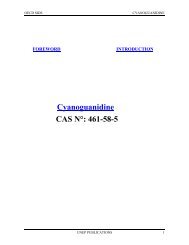POTASSIUM CHLORIDE CAS N°: 7447-40-7
POTASSIUM CHLORIDE CAS N°: 7447-40-7
POTASSIUM CHLORIDE CAS N°: 7447-40-7
Create successful ePaper yourself
Turn your PDF publications into a flip-book with our unique Google optimized e-Paper software.
OECD SIDS <strong>POTASSIUM</strong> <strong>CHLORIDE</strong><br />
Date: 30-MAR-2003<br />
5. Toxicity Substance ID: <strong>7447</strong>-<strong>40</strong>-7<br />
secondary active transport of sodium, and also<br />
passive diffusion.<br />
Excretion and retention of potassium is regulated<br />
by the main adrenal cortical hormones, although<br />
the pituary also influences electrolyte balance<br />
in the body. Adrenal mineralocorticoids such as<br />
aldosterone increase tubular reabsorption of<br />
sodium in association with secretion of potassium<br />
and H + , and also reabsorption with chloride.<br />
Chloride reabsorption is increased when<br />
bicarbonate reabsorption is decreased, and vice<br />
versa.<br />
Normal homeostatic mechanisms controlling the<br />
serum potassium levels allow a wide range of<br />
dietary intake. The renal excretory mechanism is<br />
designed for efficient removal of excess K,<br />
rather for its conservation during deficiency.<br />
Even with no intake of K, man loses a minimum of<br />
585-1170 mg K per day. However, the distribution<br />
of potassium between the intracellular and the<br />
extracellular fluids can markedly affect the<br />
serum potassium level without a change in total<br />
body potassium.<br />
In the parietal cells in the gastric mucosa, H +<br />
and Cl - are transported actively across the apical<br />
membrane into the lumen of the stomach. This<br />
secretion of HCl is regulated by the hormone<br />
gastrin in response to intragastric protein and<br />
stomach distention.<br />
Source:<br />
Norsk Hydro ASA<br />
Reliability: (1) reliable without restrictions<br />
Flag: non confidential<br />
01-MAR-2001 (30)(32)(35)(45)(65)(74)<br />
Type:<br />
Remark:<br />
Therapeutic uses<br />
Diarrhea, emsis, diuresis, starvation, prolonged<br />
saline infusion, renal filaure, or dietary<br />
deficiency, may lead to K deficiency. Hypokalemia<br />
is characterized by muscle weakness, cardiac<br />
arrythmia, paralysis, bone fragility, sterility,<br />
adrenal hypertrophy, decreased growth rate, loss<br />
of weight and death.<br />
Potassium chloride is of value for the relief of<br />
symptoms of hypokaliemic periodic paralysis, and<br />
the symptoms of Meniere’s disease. Daily intake of<br />
potassium decreases the risk of stroke-associated<br />
mortality.<br />
Source:<br />
Reliability:<br />
Usual therapeutic doses for oral solution-adults<br />
are 1.5-3 g/day to prevent depletion, and 3-7.5<br />
g/day for replacement. Doses given by intravenous<br />
infusion (adults) is not to exceed a total dose<br />
of 200-<strong>40</strong>0 mEq/day, depending on plasma potassium<br />
levels.<br />
Norsk Hydro ASA<br />
(1) reliable without restrictions<br />
80<br />
UNEP PUBLICATIONS



